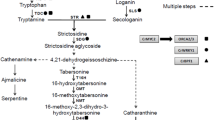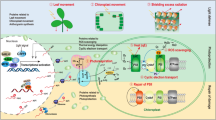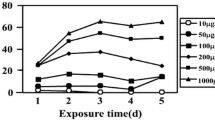Abstract
Melatonin (Mel) and CaCl2 have been demonstrated to play significant roles in plant cold tolerance. However, studies on their mechanisms of action are relatively limited. In this study, the effects of Mel and CaCl2 on the growth of cucumber seedlings under low-temperature stress (10 °C/6 °C, day/night) and the possible interplay between Mel and CaCl2 in this process were investigated. The results indicated that Mel and CaCl2 at different concentrations inhibited low-temperature-induced reactive-oxygen species burst and decreased lipid peroxidation levels when compared with low-temperature stress alone, with the most significant effects being observed in the treatment with 100 μM Mel and 10 mM CaCl2 (P < 0.05). The foliar application of 100 μM Mel and 10 mM CaCl2 also increased the accumulation of osmoprotective compounds in different organs and the root vigor of cucumber seedlings under low-temperature conditions. However, the above favorable effects of Mel and CaCl2 were significantly negated by the combined treatment of p-chlorophenylalanine (p-CPA, inhibitor of Mel biosynthesis) with Mel and that of lanthanum chloride (LaCl3, Ca2+ channel blocker), ethylene glycol tetraacetic acid (EGTA, Ca2+ chelator), trifluoperazine dihydrochloride (TFP, calmodulin antagonist and CDPK inhibitor), or N-(6-Aminohexyl)-5-chloro-1-naphthalenesulfonamide hydrochloride (W-7, calmodulin antagonist and CDPK inhibitor) with CaCl2. Furthermore, increased photosynthetic efficiency (confirmed by chlorophyll fluorescence parameters) and expression levels of photosynthesis-related genes (Rbc L, Rbc S, RCA, FBPase, and SBPase) were observed in cucumber seedlings pretreated with Mel and CaCl2 under low-temperature stress. Intriguingly, co-treatment of LaCl3/EGTA or TFP/W-7 with Mel significantly attenuated the effects of Mel on the growth and photosynthesis of cucumber seedlings under low-temperature stress. In contrast, p-CPA had slight or no effect on the growth and photosynthesis by CaCl2. These results suggested that Mel and CaCl2 could improve the cold tolerance of cucumber seedlings by maintaining redox homeostasis and osmotic balance and improving photosynthetic efficiency. In addition, Mel confers cold tolerance to cucumber seedlings in a Ca2+ signaling (Ca2+/CDPKs and Ca2+/CaM)-dependent manner. In conclusion, this study revealed the positive regulatory effects of exogenous Mel and CaCl2 on the cold tolerance of cucumber seedlings and their interactions during this process. This work could also promote the application of these two substances in agriculture and provide a reference for the study of their mechanisms of action.











Similar content being viewed by others
References
Ahammed GJ, Xu W, Liu A, Chen S (2019) Endogenous melatonin deficiency aggravates high temperature-induced oxidative stress in Solanum lycopersicum L. Environ Exp Bot 161:303–311. https://doi.org/10.1016/j.envexpbot.2018.06.006
Ahammed GJ, Mao Q, Yan Y et al (2020) Role of melatonin in arbuscular mycorrhizal fungi-induced resistance to fusarium wilt in cucumber. Phytopathology 110:999–1009. https://doi.org/10.1094/PHYTO-11-19-0435-R
Arnao MB, Hernández-Ruiz J (2021) Melatonin as a regulatory hub of plant hormone levels and action in stress situations. Plant Biol 23:7–19. https://doi.org/10.1111/plb.13202
Arshi A, Abdin MZ, Iqbal M (2005) Ameliorative effects of CaCl2 on growth, ionic relations, and proline content of Senna under salinity stress. J Plant Nutr 28(1):101–125. https://doi.org/10.1081/PLN-200042185
Banerjee A, Roychoudhury A (2019) Cold stress and photosynthesis. Photosynthesis, productivity and environmental stress. Wiley, Hoboken, pp 27–37
Bradford M (1976) A rapid and sensitive method for the quantitation of microgram quantities of protein utilizing the principle of protein-dye binding. Anal Biochem 72:248–254. https://doi.org/10.1006/abio.1976.9999
Brengi SH, Khedr AAEM, Abouelsaad IA (2022) Effect of melatonin or cobalt on growth, yield and physiological responses of cucumber (Cucumis sativus L.) plants under salt stress. J Saudi Soc Agric Sci 21:51–60. https://doi.org/10.1016/j.jssas.2021.06.012
Chang J, Guo Y, Li J et al (2021) Positive interaction between H2O2 and Ca2+ mediates melatonin-induced CBF pathway and cold tolerance in watermelon (Citrullus lanatus L.). Antioxidants 10(9):1457. https://doi.org/10.3390/antiox10091457
Chen YH, Kao CH (2012) Calcium is involved in nitric oxide- and auxin-induced lateral root formation in rice. Protoplasma 249(1):187–195. https://doi.org/10.1007/s00709-011-0277-2
Chen L, Liu L, Lu B et al (2020) Exogenous melatonin promotes seed germination and osmotic regulation under salt stress in cotton (Gossypium hirsutum L.). PLoS ONE 15:e0228241. https://doi.org/10.1371/journal.pone.0228241
Chen X, Zhang R, Li B, Cui T, Liu C, Liu C et al (2022) Alleviation of oxidative damage induced by CaCl2 priming is related to osmotic and ion stress reduction rather than enhanced antioxidant capacity during germination under salt stress in sorghum. Front Plant Sci 13:881039. https://doi.org/10.3389/fpls.2022.881039
Cisse E-HM, Zhang L-J, Pu Y-J et al (2021) Exogenous Ca2+ associated with melatonin alleviates drought-induced damage in the woody tree Dalbergia odorifera. J Plant Growth Regul. https://doi.org/10.1007/s00344-021-10449-5
Corpas FJ, Rodríguez-Ruiz M, Muñoz-Vargas MA et al (2022) Interactions of melatonin, ROS and NO during fruit ripening: an update and prospective view. J Exp Bot. https://doi.org/10.1093/jxb/erac128
Feng Y, Fu X, Han L et al (2021) Nitric oxide functions as a downstream signal for melatonin-induced cold tolerance in cucumber seedlings. Front Plant Sci 12:686545. https://doi.org/10.3389/fpls.2021.686545
Hossain MdS, Li J, Sikdar A et al (2020) Exogenous melatonin modulates the physiological and biochemical mechanisms of drought tolerance in tartary buckwheat (Fagopyrum tataricum (L.) Gaertn). Molecules 25(12):2828. https://doi.org/10.3390/molecules25122828
Hou Y, Li Z, Zheng Y, Jin P (2021) Effects of CaCl2 treatment alleviates chilling injury of loquat fruit (Eribotrya japonica) by modulating ROS homeostasis. Foods 10(7):1662. https://doi.org/10.3390/foods10071662
Hwarari D, Guan Y, Ahmad B et al (2022) ICE-CBF-COR signaling cascade and its regulation in plants responding to cold stress. Int J Mol Sci 23:1549. https://doi.org/10.3390/ijms23031549
Imran M, Latif Khan A, Shahzad R et al (2021) Exogenous melatonin induces drought stress tolerance by promoting plant growth and antioxidant defence system of soybean plants. AoB Plants. https://doi.org/10.1093/aobpla/plab026
Irigoyen JJ, Einerich DW, Sanchez-Diaz M (1992) Water stress induced changes in concentrations of proline and total soluble sugars in nodulated alfalfa (Medicago sativd) plants. Physiol Plant 84:55–60. https://doi.org/10.1111/j.1399-3054.1992.tb08764.x
Issam N, Kawther M, Haythem M, Moez J (2012) Effects of CaCl2 pretreatment on antioxidant enzyme and leaf lipid content of faba bean (Vicia faba L.) seedlings under cadmium stress. Plant Growth Regul 68:37–47. https://doi.org/10.1007/s10725-012-9691-5
Jacyn Baker C, Mock NM (1994) An improved method for monitoring cell death in cell suspension and leaf disc assays using evans blue. Plant Cell Tissue Organ Cult 39:7–12. https://doi.org/10.1007/BF00037585
Jafari M, Shahsavar AR, Talebi M, Hesami M (2022) Exogenous melatonin protects lime plants from drought stress-induced damage by maintaining cell membrane structure, detoxifying ROS and regulating antioxidant systems. Hortic 8:257. https://doi.org/10.3390/horticulturae8030257
Jahan MS, Shu S, Wang Y et al (2019) Melatonin alleviates heat-induced damage of tomato seedlings by balancing redox homeostasis and modulating polyamine and nitric oxide biosynthesis. BMC Plant Biol 19:414. https://doi.org/10.1186/s12870-019-1992-7
Kaczmarek M, Fedorowicz-Strońska O, Głowacka K et al (2017) CaCl2 treatment improves drought stress tolerance in barley (Hordeum vulgare L.). Acta Physiol Plant 39:41. https://doi.org/10.1007/s11738-016-2336-y
Korkmaz A, Değer Ö, Szafrańska K et al (2021) Melatonin effects in enhancing chilling stress tolerance of pepper. Sci Hortic 289:110434. https://doi.org/10.1016/j.scienta.2021.110434
Li H, Chang J, Chen H et al (2017) Exogenous melatonin confers salt stress tolerance to watermelon by improving photosynthesis and redox homeostasis. Front Plant Sci 8:295. https://doi.org/10.3389/fpls.2017.00295
Li X, Brestic M, Tan D-X et al (2018) Melatonin alleviates low PS I-limited carbon assimilation under elevated CO2 and enhances the cold tolerance of offspring in chlorophyll b-deficient mutant wheat. J Pineal Res 64:e12453. https://doi.org/10.1111/jpi.12453
Li H, Guo Y, Lan Z et al (2021a) Melatonin antagonizes ABA action to promote seed germination by regulating Ca2+ efflux and H2O2 accumulation. Plant Sci 303:110761. https://doi.org/10.1016/j.plantsci.2020.110761
Li H, Guo Y, Lan Z et al (2021b) Methyl jasmonate mediates melatonin-induced cold tolerance of grafted watermelon plants. Hortic Res 8:57. https://doi.org/10.1038/s41438-021-00496-0
Li Y, Sun Y, Ma C et al (2021c) 24-epibrassinolide enhanced cold tolerance of winter turnip rape (Brassica rapa L.). Biologia (bratisl) 76:2859–2877. https://doi.org/10.1007/s11756-021-00834-6
Li J, Liu Y, Zhang M et al (2022) Melatonin increases growth and salt tolerance of Limonium bicolor by improving photosynthetic and antioxidant capacity. BMC Plant Biol 22:16. https://doi.org/10.1186/s12870-021-03402-x
Lin K-H, Lin T-Y, Wu C-W, Chang Y-S (2021) Protective effects of salicylic acid and calcium chloride on sage plants (Salvia officinalis L. and Salviaelegans Vahl) under high-temperature stress. Plants 10:2110. https://doi.org/10.3390/plants10102110
Liu J, Sun J, Pan Y et al (2021) Endogenous melatonin generation plays a positive role in chilling tolerance in relation to redox homeostasis in litchi fruit during refrigeration. Postharvest Biol Tec 178:111554. https://doi.org/10.1016/j.postharvbio.2021.111554
Luis Castañares J, Alberto Bouzo C (2019) Effect of exogenous melatonin on seed germination and seedling growth in melon (Cucumis melo L.) under salt stress. Hortic Plant J 5:79–87. https://doi.org/10.1016/j.hpj.2019.01.002
Madany M, Khalil R (2017) Seed priming with ascorbic acid or calcium chloride mitigates the adverse effects of drought stress in sunflower (Helianthus annuus L.) seedlings. Egypt J Exp Biol. https://doi.org/10.5455/egyjebb.20170409090612
Niu L, Yu J, Liao W, et al (2017) Calcium and calmodulin are involved in nitric oxide-induced adventitious rooting of cucumber under simulated osmotic stress. Front Plant Sci 8:1684. https://doi.org/10.3389/fpls.2017.01684
Nouairi I, Jalali K, Zribi F et al (2019) Seed priming with calcium chloride improves the photosynthesis performance of faba bean plants subjected to cadmium stress. Photosynthetica 57:438–445. https://doi.org/10.32615/ps.2019.055
Park S-H, Lee B-R, La VH et al (2021) Characterization of salicylic acid- and abscisic acid-mediated photosynthesis, Ca2+ and H2O2 accumulation in two distinct phases of drought stress intensity in Brassica napus. Environ Exp Bot 186:104434. https://doi.org/10.1016/j.envexpbot.2021.104434
Pirayesh N, Giridhar M, ben Khedher A et al (2021) Organellar calcium signaling in plants: an update. Biochim Biophys Acta Mol Cell Res 1868:118948. https://doi.org/10.1016/j.bbamcr.2021.118948
Ritonga FN, Chen S (2020) Physiological and molecular mechanism involved in cold stress tolerance in plants. Plants 9:560. https://doi.org/10.3390/plants9050560
Sabagh AEL, Hossain A, Islam MS et al (2021) Prospective role of plant growth regulators for tolerance to abiotic stresses. Plant growth regulators. Springer International Publishing, Cham, pp 1–38
Satpathy SN, Mishra S, Adhya TK et al (1998) Cultivar variation in methane efflux from tropical rice. Plant Soil 202:223–229. https://doi.org/10.1023/A:1004385513956
Shahzad A, Ullah S, Dar AA et al (2021) Nexus on climate change: agriculture and possible solution to cope future climate change stresses. Environ Sci Pollut Res Int 28(12):14211–14232. https://doi.org/10.1007/s11356-021-12649-8
Sharma A, Wang J, Xu D et al (2020) Melatonin regulates the functional components of photosynthesis, antioxidant system, gene expression, and metabolic pathways to induce drought resistance in grafted Carya cathayensis plants. Sci Total Environ 713:136675. https://doi.org/10.1016/j.scitotenv.2020.136675
Sharma A, Negi NP, Raina M et al (2022) Phytomelatonin: molecular messenger for stress perception and response in plants. Environ Exp Bot 201:104980. https://doi.org/10.1016/j.envexpbot.2022.104980
Sun B, Liu G-L, Phan TT et al (2017) Effects of cold stress on root growth and physiological metabolisms in seedlings of different sugarcane varieties. Sugar Tech 19:165–175. https://doi.org/10.1007/s12355-016-0452-z
Sun Y, Ma C, Kang X et al (2021) Hydrogen sulfide and nitric oxide are involved in melatonin-induced salt tolerance in cucumber. Plant Physiol Biochem 167:101–112. https://doi.org/10.1016/j.plaphy.2021.07.023
Tong T, Li Q, Jiang W et al (2021) Molecular evolution of calcium signaling and transport in plant adaptation to abiotic stress. Int J Mol Sci 22:12308. https://doi.org/10.3390/ijms222212308
Vafadar F, Amooaghaie R, Ehsanzadeh P et al (2020a) Crosstalk between melatonin and Ca2+/CaM evokes systemic salt tolerance in Dracocephalum kotschyi. J Plant Physiol 252:153237. https://doi.org/10.1016/j.jplph.2020.153237
Vafadar F, Amooaghaie R, Ehsanzadeh P et al (2020b) Melatonin and calcium modulate the production of rosmarinic acid, luteolin, and apigenin in Dracocephalum kotschyi under salinity stress. Phytochemistry 177:112422. https://doi.org/10.1016/j.phytochem.2020.112422
Wang K, Xing Q, Ahammed GJ, Zhou J (2022) Functions and prospects of melatonin in plant growth, yield and quality. J Exp Bot. https://doi.org/10.1093/jxb/erac233
Wei L, Zhao H, Wang B et al (2021) Exogenous melatonin improves the growth of rice seedlings by regulating redox balance and ion homeostasis under salt stress. J Plant 41(6):2108
Xiong T, Tan Q, Li S et al (2021) Interactions between calcium and ABA signaling pathways in the regulation of fruit ripening. J Plant Physiol 256:153309. https://doi.org/10.1016/j.jplph.2020.153309
Yan F, Zhang J, Li W et al (2021) Exogenous melatonin alleviates salt stress by improving leaf photosynthesis in rice seedlings. Plant Physiol Biochem 163:367–375. https://doi.org/10.1016/j.plaphy.2021.03.058
Yang W, Gao Y, Wang X et al (2022) Exogenous calcium application enhances salt tolerance of sweet sorghum seedlings. J Agro Crop Sci. https://doi.org/10.1111/jac.12585
Yemm EW, Willis AJ (1954) The estimation of carbohydrates in plant extracts by anthrone. Biochem J 57(3):508–514. https://doi.org/10.1042/bj0570508
Yin Y, Yang R, Guo Q, Gu Z (2014) NaCl stress and supplemental CaCl2 regulating GABA metabolism pathways in germinating soybean. Eur Food Res Technol 238:781–788. https://doi.org/10.1007/s00217-014-2156-5
Yuan W, Zhang Q, Li Y et al (2021) Abscisic acid is required for root elongation associated with Ca2+ influx in response to water stress. Plant Physiol Biochem 169:127–137. https://doi.org/10.1016/j.plaphy.2021.11.002
Zeng H, Bai Y, Wei Y et al (2022) Phytomelatonin as a central molecule in plant disease resistance. J Exp. https://doi.org/10.1093/jxb/erac111
Zhang T, Yang Hakeem H (2022) Physiological and biochemical mechanisms of exogenous calcium chloride on alleviating salt stress in two tartary buckwheat (Fagopyrum tataricum) varieties differing in salinity tolerance. Phyton 91:1–16. https://doi.org/10.32604/phyton.2022.019572
Zhang H, Dong J, Zhao X et al (2019) Research progress in membrane lipid metabolism and molecular mechanism in peanut cold tolerance. Front Plant Sci 10:838. https://doi.org/10.3389/fpls.2019.00838
Zhang T, Shi Z, Zhang X et al (2020a) Alleviating effects of exogenous melatonin on salt stress in cucumber. Sci Hortic 262:109070. https://doi.org/10.1016/j.scienta.2019.109070
Zhang Z, Wu P, Zhang W et al (2020b) Calcium is involved in exogenous NO-induced enhancement of photosynthesis in cucumber (Cucumis sativus L.) seedlings under low temperature. Sci Hortic 261:108953. https://doi.org/10.1016/j.scienta.2019.108953
Zhang Y, Fan Y, Rui C et al (2021) Melatonin improves cotton salt tolerance by regulating ROS scavenging system and Ca2+ signal transduction. Front Plant Sci 12:693690. https://doi.org/10.3389/fpls.2021.693690
Zhang X-H, Ma C, Zhang L et al (2022) GR24-mediated enhancement of salt tolerance and roles of H2O2 and Ca2+ in regulating this enhancement in cucumber. J Plant Physiol 270:153640. https://doi.org/10.1016/j.jplph.2022.153640
Zhao H, Zhang Z, Zhang Y et al (2022) Melatonin reduces photoinhibition in cucumber during chilling by regulating the calvin-benson cycle. Sci Hortic. https://doi.org/10.1016/j.scienta.2022.111007
Zrig A, AbdElgawad H, Touneckti T et al (2021) Potassium and calcium improve salt tolerance of Thymus vulgaris by activating the antioxidant systems. Sci Hortic 277:109812. https://doi.org/10.1016/j.scienta.2020.109812
Acknowledgements
This work was supported by the National Natural Science Foundation of China (Grant Numbers 32060711, 31860054), Gansu Provincial Education and Science Technology Innovation Project (Grant No. 2021CXZX-186).
Author information
Authors and Affiliations
Contributions
TGZ: Supervision, Design of experiment, Funding acquisition, Writing-Reviewing and Editing. CM: Design of experiment, Performed experiment, Methodology, Writing-Original draft preparation, Modified manuscript. ZQP: Performed experiment, Data curation, Modified manuscript. XB: Performed experiment, Collection of literature. SHL, MS, XK, and HXG: Collection of literature. JW: Software, Methodology. SZ: Formal analysis, Validation.
Corresponding authors
Ethics declarations
Competing interest
We declare that there is no conflict of interest between our papers and any organization or individual.
Additional information
Handling Editor: Shuxin Ren.
Publisher's Note
Springer Nature remains neutral with regard to jurisdictional claims in published maps and institutional affiliations.
Rights and permissions
Springer Nature or its licensor holds exclusive rights to this article under a publishing agreement with the author(s) or other rightsholder(s); author self-archiving of the accepted manuscript version of this article is solely governed by the terms of such publishing agreement and applicable law.
About this article
Cite this article
Ma, C., Pei, ZQ., Bai, X. et al. Exogenous Melatonin and CaCl2 Alleviate Cold-Induced Oxidative Stress and Photosynthetic Inhibition in Cucumber Seedlings. J Plant Growth Regul 42, 3441–3458 (2023). https://doi.org/10.1007/s00344-022-10805-z
Received:
Accepted:
Published:
Issue Date:
DOI: https://doi.org/10.1007/s00344-022-10805-z




